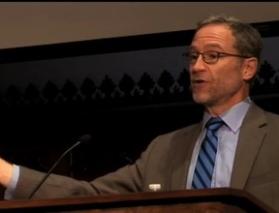In some theological traditions, justification is seen as simply an “entrance term,” or an event that happens at the beginning of the ordo salutis (order of salvation). Sanctification then arises after justification, and it is sanctification, rather than justification, which defines the Christian life. It is better, however, not to view justification simply as a one time occurrence in the beginning of the life of faith, which is then forgotten or fades into the background to make way for sanctification. Rather, justification is the continual status, the repeated declaration of God upon the sinner who is righteous in Christ. One’s relationship to God (coram Deo) is always based solely on the imputed righteousness of Christ.
Note that in the book of Romans, Paul gives two particular examples of justification by faith from the Old Testament. The first is Abraham, and the second is David. In both instances, these figures are describing a time in their life of faith which occurred after their conversion. The citation regarding Abraham is from Genesis 15, when God gives Abraham the promise. If one looks back to the text of Genesis, it is apparent that Abraham’s faith is already present in Genesis 12, wherein he left his old life to follow God’s calling. Yet, it is stated in Genesis 15 that Abraham was righteous before God solely by faith. Even the sanctified Abraham, who had done the good work of leaving his entire life behind to follow God, was reliant solely on God’s promise for his righteousness. It is the sanctified Abraham who is used by Paul as an example of God justifying the “ungodly” (Rom. 4:5). Similarly, Paul mentions David in Psalm 32 who speaks of the forgiveness God grants him apart from works (Rom. 4:6-8). David was not, in this text, explaining his entrance into the faith, but the life of a faithful man who struggled with sin.
The problem with much of Christian preaching and piety is that this understanding of justification as continual is lost. When this occurs, there are two primary errors that occur. On the one hand, some simply forget justification, seeing sanctification as the “real business” of the Christian life. On the other, some people fear legalism to such an extent that they are content to ignore sanctification and continue to point people back to a justification that occurred sometime in the past. When emphasizing the continual nature of justification, we can 1. assure people that their relationship to God is always one of passively receiving Christ’s righteousness, and 2. discuss sanctification without a fear of justification fading into the background, since justification is always happening.
So where does sanctification fit into all this? If justification frames the entire Christian life coram Deo, is there even a place for sanctified living? The Christian who is continually justified through God’s declarative Word is also in a process of sanctification. In some sense, these two realities are two different aspects of the same reality. Justification and sanctification are two expressions of what it means that I am in Christ. Before God, this reality looks like a beggar receiving righteousness as a free gift. Before the world, this looks like me performing good works and developing Christian character as Christ lives in me. But justification never fades into the background to somehow “make way” for sanctification. Rather, Christ is most foundationally working for me, and then consequently, he is working in me. The doubting Christian need not look back to some conversion experience in the past to find grace, or to progress in virtue, but to God’s promise here and now, because Christ’s righteousness is being continually imputed to the believer, framing one’s entire life in Christ.
(The title of this article comes from a rather bizarre claim about what I believe)












